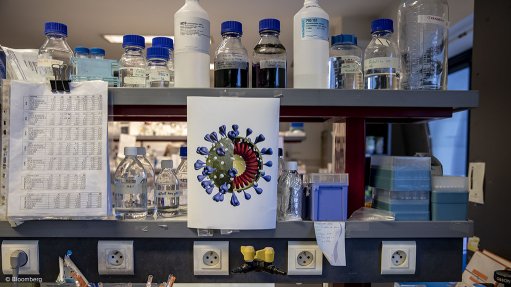
Photo by: Bloomberg
The University of Oxford and AstraZeneca researchers have presented an analysis of Phase 3 trials of their Covid-19 vaccine, which has been shown to result in an average efficacy of 70.4%.
The results were published in prestigious scientific journal The Lancet, on Tuesday, making it the first time Covid-19 vaccine Phase 3 human trial results have been peer-reviewed and published in a scientific journal.
The efficacy results are based on 11 636 volunteers across the UK and Brazil, across three groups of people vaccinated – two groups who received a standard dose prime vaccination followed by a standard dose booster vaccination, and one group (in the UK only) who received a low dose prime vaccination followed by a standard dose vaccination.
Scientists from the University of the Witwatersrand (Wits) led the South African phase of the trails, however, local data was not used to evaluate the vaccine’s efficacy as few Covid-19 cases occurred in South Africa at least 14 days after volunteers had received their second dose of the vaccine.
The peer review data showed no hospitalisations or sever disease occurred in vaccinated groups.
Wits Vaccines and Infectious Diseases Analytics Research Unit (VIDA) executive director Professor Shabir Madhi says the vaccine is being evaluated in the study among 2 100 South Africans who are being followed up with for Covid-19 illnesses before a South African efficacy analysis can be done.
“The results being reported today herald a milestone in the development of Covid-19 vaccines, with the results now having gone through rigorous scientific peer review and being available for interrogation by the general scientific community and the public,” he says.
He added that this Covid-19 vaccine could be deployed in low- and middle-income countries in the immediate future compared with the mRNA Covid-19 vaccines.
The study also suggests that the Oxford vaccine is likely to be more widely available, owing to manufacturing capacity, and will likely be the most affordable of the three Covid-19 vaccines for which the safety and efficacy have now been reported.
“It is essential that the South Africa government is pro-active in pursuing all options to ensure early access – at an affordable price – for large quantities of Covid-19 vaccine to be made available in South Africa, with immunization ideally starting before a widespread resurgence of Covid-19, which I anticipate will be more prevalent in the first quarter of 2021,” Madhi said.